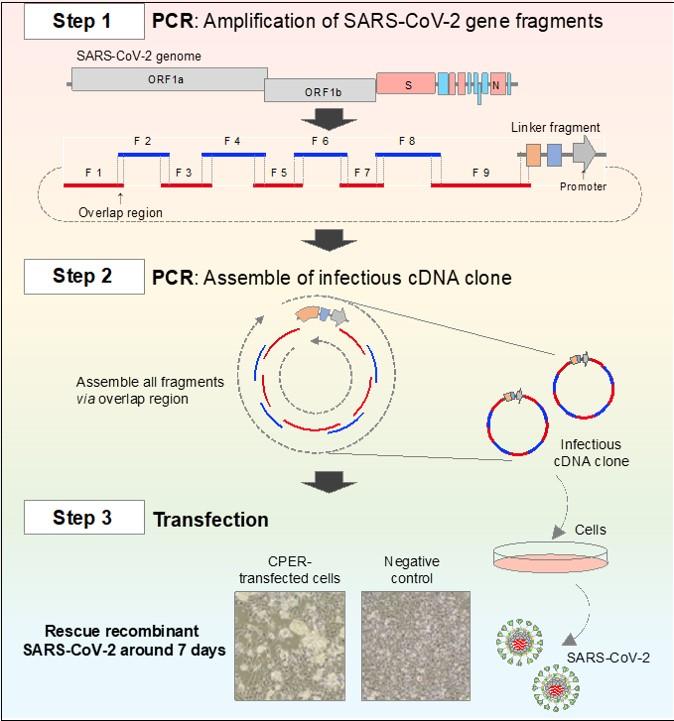Researchers from Osaka University and Hokkaido University develop a system for analyzing mutations in SARS-CoV-2 that is much simpler and faster than existing methods

Credit: Osaka University
Osaka, Japan – SARS-CoV-2 is the virus responsible for the COVID-19 pandemic. We know that mutations in the genome of SARS-CoV-2 have occurred and spread, but what effect do those mutations have? Current methods for studying mutations in the SARS-CoV-2 genome are very complicated and time-consuming because coronaviruses have large genomes, but now a team from Osaka University and Hokkaido University have developed a quick, PCR-based reverse genetics system for analyzing SARS-CoV-2 mutations.
This system uses the polymerase chain reaction (PCR) and a circular polymerase extension reaction (CPER) to reconstruct the full-length cDNA of viral genome. This process does not involve the use of bacteria, which can introduce further unwanted mutations, and takes only two weeks using simple steps to generate infectious virus particles. Previous methods took a couple of months and were very complicated procedures.
“This method allows us to quickly examine the biological features of mutations in the SARS-CoV-2,” says lead author of the study Shiho Torii. “We can use the CPER technique to create recombinant viruses with each mutation and examine their biological features in comparison with the parental virus.” The large circular genome of SARS-CoV-2 can be constructed from smaller DNA fragments that can then be made into a viable viral genome with CPER, and used to infect suitable host cells. A large amount of infectious virus particles can be recovered nine days later.
“We believe that our CPER method will contribute to the understanding of the mechanisms underlying propagation and pathogenesis of SARS-CoV-2, as well as help determine the biological significance of emerging mutations,” explains corresponding author Yoshiharu Matsuura. “This could accelerate the development of novel therapeutics and preventative measures for COVID-19.” The team also suggest that the use of the CPER method will allow researchers to insert “reporter genes” into the SARS-CoV-2 genome to “tag” genes or proteins of interest. This will enable a greater understanding of how SARS-CoV-2 infects cells and causes COVID-19, assisting with the development of therapies. The CPER method could even allow a recombinant virus that is unable to cause disease to be generated, which could be used as a safe and effective vaccine for SARS-CoV-2.
Mutations are arising in the SARS-CoV-2 population all the time, as well as questions as to what those mutations do and whether they could affect the efficacy of vaccines. “Our simple and rapid method allows scientists around the globe to characterize the mutants, which is a vital step forward in our fight against the SARS-CoV-2,” says Takasuke Fukuhara of the research group.
###
The article, “Establishment of a reverse genetics system for SARS-CoV-2 using circular polymerase extension reaction,” was published in Cell Reports at DOI: https:/
Contacts:
-Osaka University
Specially Appointed Professor Yoshiharu Matsuura
Center for Infectious Diseases Education and Research (CIDER)
Research Institute for Microbial Diseases
Osaka University
Email: matsuura[at]biken.osaka-u.ac.jp
Saya Nakagomi (PR Officer)
Research Institute for Microbial Diseases
Osaka University
Email: biken-pr[at]biken.osaka-u.ac.jp
-Hokkaido University
Professor Takasuke Fukuhara
Graduate School of Medicine
Hokkaido University
Email: fukut[at]pop.med.hokudai.ac.jp
Naoki Namba (Media Officer)
Institute for International Collaboration
Hokkaido University
Tel: +81-11-706-2185
Email: pr[at]oia.hokudai.ac.jp
About Osaka University
Osaka University was founded in 1931 as one of the seven imperial universities of Japan and is now one of Japan’s leading comprehensive universities with a broad disciplinary spectrum. This strength is coupled with a singular drive for innovation that extends throughout the scientific process, from fundamental research to the creation of applied technology with positive economic impacts. Its commitment to innovation has been recognized in Japan and around the world, being named Japan’s most innovative university in 2015 (Reuters 2015 Top 100) and one of the most innovative institutions in the world in 2017 (Innovative Universities and the Nature Index Innovation 2017). Now, Osaka University is leveraging its role as a Designated National University Corporation selected by the Ministry of Education, Culture, Sports, Science and Technology to contribute to innovation for human welfare, sustainable development of society, and social transformation.
Website: https:/
About Hokkaido University
Founded in 1876 as Sapporo Agricultural College, Hokkaido University is one of the oldest, largest, and most prestigious universities in Japan. The university attracts prospective students all around the globe with the diverse degree programs offered and the all year round scenic beauty. The campuses are located in the cities of Sapporo and Hakodate of Hokkaido and 21 facilities are spread throughout Hokkaido and mainland Japan, contributing towards the resolution of global issues.
Website: https:/
Media Contact
Saori Obayashi
[email protected]
Original Source
https:/
Related Journal Article
http://dx.




